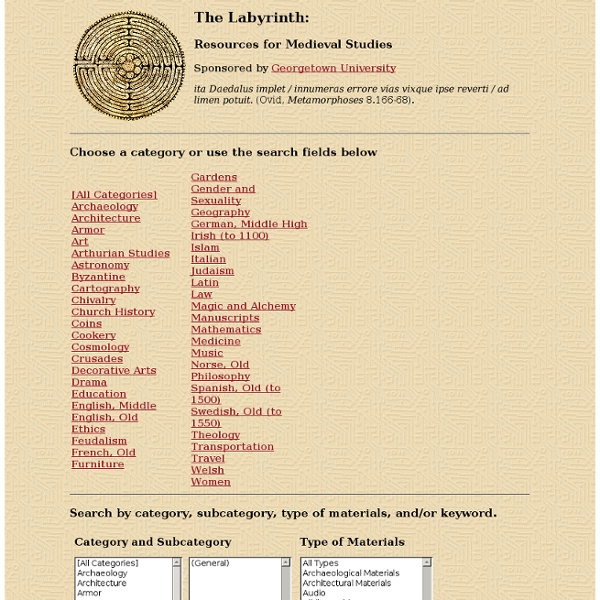



http://labyrinth.georgetown.edu/
Related: StoriaThe Classics Pages You'll find well over 1000 pages of news, information, games and controversy about the life, literature, philosophy, art and archaeology of the ancient world of Greece & Rome. Search The Classics Pages (including "The Romans" - below) has a dedicated search engine, accessible from any page. Search now. mental_floss Blog » 4 More Forgotten Founding Fathers This Saturday is July 4, a day when Americans of all shapes and sizes will come together to commemorate the founding of their country, and the noble pursuit of life, liberty, and overcooked hamburgers. Here's a quick quiz question "“ how many people signed the Declaration of Independence? We're betting that few of you, not including the people who compulsively Googled that question, knew the answer is 56. Fifty-six?! Yes, there were far more Founding Fathers than most people learn about in civics class. Last year , we told you about five of these men "“ Carter Braxton, Button Gwinnett, Robert Treat Paine, Edward Rutledge and William Whipple.
phantom time hypothesis How could I have written a whole book about conspiracy theories without once encountering Heribert Illig? I just stumbled over a reference to his “phantom time hypothesis” and now I’m finding him everywhere. A prolific crank in the grand tradition of Ignatius L. Les «Guerres de religion» sont-elles des guerres de religion ? L’expression « guerres de religion » était inconnue des hommes et des femmes qui ont vécu aux XVIe et XVIIe siècles. Annalistes et chroniqueurs employaient d’autres formules pour désigner les troubles de leur temps. En 1572, Jean Touchard parle de « guerres intestines ». Jean Heluïs, en 1573, évoque les « guerres civiles meües pour le fait de la religion ».
L’Inquisition Le pape (Sixte IV) et l'inquisiteur (Torquemada) par Jean-Paul Laurens L'inquisition épiscopale Le deuxième concile du Latran (1139) prescrit qu’il appartient aux évêques de rechercher les hérétiques, aux juges séculiers de les punir, aux rois et aux princes de prêter, sous peine de déchéance, leur concours à cette répression. Le 4 novembre 1184, le concile de Vérone donne ordre aux évêques de rechercher eux-mêmes les hérétiques ; il fait appel aux princes et aux seigneurs pour lutter contre l’hérésie sous peine d’excommunication.
2009 Les « religions orientales » dans le monde grec et romain La catégorie des "religions orientales" appartient au contexte épistémologique et culturel du début du XXe siècle. Aujourd'hui, l'étude de la diffusion des cultes étrangers et de leur insertion dans le tissu cultuel grec et romain doit plutôt se faire en termes d'intégration et d'interaction, en rapport avec la question des identités culturelles et religieuses dans un monde multiethnique et multiculturel. Le regard se porte sur divers niveaux de pénétration et de visibilité de ces cultes, sur diverses stratégies d'appropriation, ainsi que sur les deux directions des échanges culturels – d'Est en Ouest, et d'Ouest en Est. Readings & Flowcharts Search Outline of History Prehistory — Prehistory, the rise of civilization, and the ancient Middle East to c.500 B.C.E Prehistory to c.3000 BCE — Unit 1: Prehistory and the rise of Civilization to c.3000 B.C.E. FC1 — Biological, Cultural, and Technological Evolution in History FC2 — A Possible Scenario of Human Evolution FC3 — A Possible Scenario for the Evolution of the Family and Gender Roles FC4 — The Birth of Agriculture and its Effects FC5 — The Domestication of Animals and its Effects FC6 — The Rise of Cities and Hydraulic Civilizations (c. 8000-3000 BCE) FC6A — Festive Dancing and its importance in History FC6B — The Evolution of Early Civilized Warfare FC7 — The Birth of Writing and its Impact FC8 — The Birth of Metallurgy and its Impact The ancient Middle East — Unit 2: The ancient Middle East (c.3000-323 B.C.E.)
Riciclaggio della memoria: Persecuzioni contro i cristiani e bugie "religiose" di convenienza, in verità i "cristiani" non furono mai perseguitati da Roma Ante Scriptum di Paolo D'ArpiniSul tema della "persecuzione" dei primi cristiani da parte delle autorità romane mi ero già espresso in altri articoli. Ma una premessa prima di sottoporvi il testo che segue mi sembra necessaria. I primi cosiddetti cristiani non erano altri che appartenenti ad una setta ebraica che rifiutava il potere romano, anzi lo considerava "nemico", anche in seguito alla distruzione di Gerusalemme completata da Vespasiano e Tito ed alla conseguente "diaspora". In verità la "diaspora" era una realtà assodata da tempi molto anteriori alla distruzione di Gerusalemme.
Aryan migration: New genetic study makes Out of India theory backed by Hindutva supporters unlikely A new paper authored by 92 scientists from around the globe that was posted online this weekend could settle some major questions about the subcontinent’s history and what that means for various theories of Indian civilisation. The paper, titled “The Genomic Formation of South and Central Asia” which still has to go through peer review, uses genetics to examine the ancestry of ancient inhabitants of the subcontinent. Below is a quick summary of what you need to know.